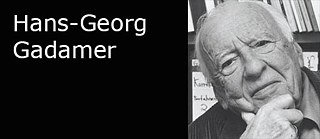Lecture
Lecture 13: Hans-Georg Gadamer (February 11, 1900 – March 13, 2002)

with Dr. Apaar Kumar und Dr. Paneerselvam
Hans-Georg Gadamer is the decisive figure in the development of twentieth century hermeneutics—almost certainly eclipsing, in terms of influence and reputation, the other leading figures, including Paul Ricoeur, and also Gianni Vattimo (Vattimo was himself one of Gadamer's students).
Trained in neo-Kantian scholarship, as well as in classical philology, and profoundly affected by the philosophy of Martin Heidegger, Gadamer developed a distinctive and thoroughly dialogical approach, grounded in Platonic-Aristotelian as well as Heideggerian thinking, that rejects subjectivism and relativism, abjures any simple notion of interpretive method, and grounds understanding in the linguistically mediated happening of tradition. Employing a more orthodox and modest, but also more accessible style than Heidegger himself, Gadamer's work can be seen as concentrated in four main areas: the first, and clearly the most influential, is the development and elaboration of a philosophical hermeneutics; the second is the dialogue within philosophy, and within the history of philosophy, with respect to Plato and Aristotle in particular, but also with Hegel and Heidegger; the third is the engagement with literature, particularly poetry, and with art; and the fourth is what Gadamer himself terms ‘practical philosophy’ (see Gadamer 2001, 78-85) encompassing contemporary political and ethical issues.
The ‘dialogical’ character of Gadamer's approach is evident, not merely in the central theoretical role he gives to the concept of dialogue in his thinking, but also in the discursive and dialogic, even ‘conversational’, character of his writing, as well as in his own personal commitment to intellectual engagement and exchange. Indeed, he is one of the few philosophers for whom the ‘interview’ has become a significant category of philosophical output (see Hahn 1997, 588-599; also Gadamer 2001, 2003).
Although he identified connections between his own work and English-speaking ‘analytic’ thought (mainly via the later Wittgenstein, but also Donald Davidson), and has sometimes seen his ideas taken up by thinkers such as Alasdair McIntyre (see MacIntyre 2002), Ronald Dworkin (see Dworkin 1986), Robert Brandom (see Brandom 2002), John McDowell (see McDowell 1996, 2002), and especially Richard Rorty (Rorty 1979), Gadamer is perhaps less well known, and certainly less well-appreciated, in philosophical circles outside Europe than are some of his near-contemporaries. He is undoubtedly, however, one of the most important thinkers of the twentieth century, having had an enormous impact on a range of areas from aesthetics to jurisprudence, and having acquired a respect and reputation in Germany, and elsewhere in Europe, that went far beyond the usual confines of academia.
(Source: https://plato.stanford.edu/entries/gadamer/)
Speakers:
Dr. Apaar Kumar, Manipal Centre for Philosophy and Humanities
Professional Qualification
PhD in Philosophy, 2009, Emory University
Research Interests
Kant, Ethical and Political Philosophy, 19th and 20th Century German Philosophy
Courses Taught Regularly
Introductory courses in philosophy, logic, and ethics; and upper level courses in the history of modern philosophy, and 19th and 20th century continental thought. At MCPH, he has taught courses in ethics, aesthetics, philosophy of language, social ontology, and the metaphysics of the self.
Dr. Paneerselvam, Former Head, Dept of Philosophy, University of Madras
Field of Specialisation:
Non-Western Philosophy, both traditional and contemporary
Contemporary Continental Philosophy with special reference to Post-Modernism
Philosophy of Language (Indian and Western)
Cross-cultural Hermeneutics
Details
Library MMB
K. Dubash Marg
Kala Ghoda
400001 Mumbai
Part of series German Intellectual Traditions: from Kant to Habermas